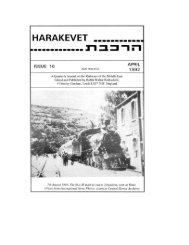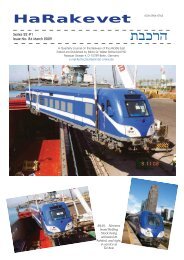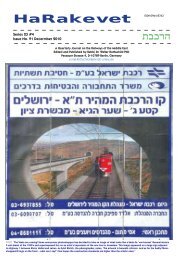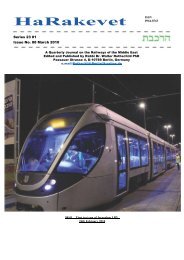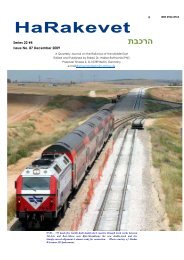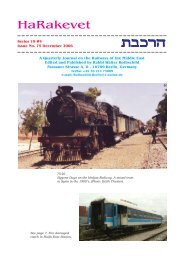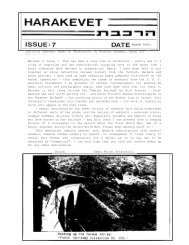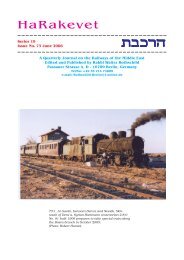Issue 72 - HaRakevet
Issue 72 - HaRakevet
Issue 72 - HaRakevet
Create successful ePaper yourself
Turn your PDF publications into a flip-book with our unique Google optimized e-Paper software.
that “Should it depend on him, he would<br />
have fired the person in the Ministry of<br />
Internal Affairs responsible for the district<br />
who is causing the delay”. He<br />
added that there will be an urgent meeting<br />
with his participation to discuss the<br />
subject, in order to enable an immediate<br />
start to the works.<br />
The event had been fully recorded<br />
by a camera installed at the level<br />
crossing, which made the work of the<br />
traffic police easier. They assume that<br />
a technical failure in the bus caused the<br />
engine shut-down, although the driver<br />
himself claims that the bus was in order;<br />
it is a 2002 model.<br />
An interesting response came<br />
from Dr. Moshe Becker, a well known<br />
specialist for transportation safety, who<br />
said that the railways should immediately<br />
add to the existing recording cameras<br />
a function that will report to the<br />
control centre and finally to the train<br />
drivers that a car is stuck on the track.<br />
He means this only for those dangerous<br />
level crossings where vision is bad<br />
or does not exist; and in his opinion it<br />
is vital for the train drivers and passengers<br />
no less than for the car drivers,<br />
who can sometimes evacuate themselves<br />
- unlike the train driver whose<br />
situation is mostly fatal; Such an addition<br />
would cost $10,870 for each level<br />
crossing and this is a fraction in the $4.5<br />
Billion budget the railways have been<br />
given.<br />
It is interesting that most people<br />
tend to forget one simple fact: More and<br />
faster trains at a higher frequency are<br />
in service on the one hand, and the<br />
growing car ownership as well as the<br />
number of lorries and other commercial<br />
vehicles on the other hand, all<br />
mean a higher possibility of collisions,<br />
particularly with the typically impatient<br />
and disobedient Israeli drivers; and<br />
beyond all: building grade separations<br />
takes time!”<br />
(ii). (ii). (ii). MORE MORE MORE ON ON ON LEVEL LEVEL LEVEL CROSS CROSS CROSS- CROSS CROSS<br />
ING ING AND AND AND GRADE GRADE SEP SEPARA SEP ARA ARATION ARATION<br />
TION IS IS- IS<br />
SUES SUES SUES. SUES<br />
GRADE GRADE SEP SEPARA SEP SEPARA<br />
ARA ARATION ARA TION WORKS WORKS. WORKS<br />
From a press release of 10.01.2006 by<br />
Israel Railways Ltd.:<br />
“On 12.01.2006, Israel Railways<br />
Ltd. will start - through its local<br />
subcontractors, Y. Shomroni Company<br />
and Malibu Company - the implementation<br />
of four grade separations at level<br />
crossings on the Na’an - Kiryat-Gat<br />
section (of the Tel-Aviv - Beer-Sheva<br />
line), as part of a major project which<br />
will include seven additional grade<br />
separations on the Kiryat-Gat - Beer-<br />
Sheva section; The cost of the project is<br />
$24 Million, and completion is expected<br />
Page 4<br />
towards the end of 2007.<br />
The Railways’ General Manager<br />
Mr. Ofer Linchevsky said: “For Israel<br />
Railways Ltd. the closure of each level<br />
crossing - if possible - is a main target;<br />
The aim of building the grade separations<br />
at level crossings all over Israel, is<br />
primarily to increase travellng and travellers’<br />
safety; From July 2005 we have<br />
closed all the unprotected level crossings<br />
on passenger lines, and we’ve also<br />
come to a decision that there will be no<br />
unprotected level crossing; We’ve decided<br />
that there will be no level crossings<br />
on new lines. This has actually been<br />
implemented already on the lines to<br />
Ben-Gurion airport and to Rishon-Le-<br />
Zion (HaRishonim).”<br />
From a press release of<br />
15.01.2006 by the Transport Ministry:<br />
“Transport Minister Mr. Meir<br />
Shitrit, has announced to-day that the<br />
Ministry has prepared a revolutionary<br />
plan for replacing most of the existing<br />
level crossings with grade separations<br />
within three years.<br />
The plan has been prepared by<br />
the newly created Upper Steering Committee,<br />
which includes - for the first time<br />
- representatives of all the boards responsible<br />
for road and rail, namely:<br />
Israel Railways Ltd., The National Company<br />
for Roads (formerly Public Works<br />
Department of the Transport Ministry),<br />
Netivey-Ayalon (Ayalon Roads - an engineering<br />
and implementation company<br />
for roads in the Greater Tel-Aviv<br />
Area), Yefe-Nof Company (the sister<br />
company of Netivei-Ayalon, working at<br />
the Greater Haifa Area), and the local<br />
authorities along railway lines. It has<br />
mapped all the 154 existing level crossings,<br />
and found that at least 75 and up<br />
to 109 such must be replaced by grade<br />
separations; Most of the rest need a<br />
system of new traffic arrangements including<br />
signs, flashing lights etc.; some<br />
will be closed.<br />
Mr. Linchevsky said that the cost<br />
of the whole plan is $530 Million, and<br />
it will be carried out in two stages:.In<br />
the first stage, $260 Million will be invested<br />
in 31 existing grade separations,<br />
which have been defined by the<br />
Technion (Israeli High Technical School)<br />
as the most urgent; Simultaneously,<br />
work on 36 additional grade separations,<br />
included in the 5-Year Plan of the<br />
railways and the 5-Year plan of the<br />
National Roads Company will be carried<br />
out; the rest will be implemented<br />
in the second stage.<br />
Among the urgent grade separations<br />
to be carried out are those at:<br />
Ad-Halom (Ashdod) interchange (road<br />
No. 4); Bnei-Darom junction (near the<br />
,cfrv<br />
,cfrv<br />
main entrance to Ashdod on road<br />
No.41); Kfar-Gbirol junction (near<br />
Rehovot on road No. 410); Near Beit-<br />
Yehoshua (on road No. 553 crossing<br />
the Tel-Aviv - Haifa line south of<br />
Netanya and near IKEA); near Kfar-<br />
Neter (near Netanya crossing road No.<br />
561); Akko-North junction (on road No.<br />
8510); at the industrial area of Kiryat-<br />
Gat; between Binyamina and Zikhron-<br />
Yaakov (on the Tel-Aviv - Haifa line<br />
crossing road No. 4).”<br />
(iii). (iii). A AAGRICUL<br />
A GRICUL GRICULTURAL GRICUL TURAL CROSS CROSS- CROSS<br />
INGS INGS. INGS INGS<br />
The Transport Ministry’s General<br />
Manager Mr. Arie Bar has instructed the<br />
railways to create a new procedure,<br />
which includes clear criteria for opening<br />
level crossings for passage of agricultural<br />
vehicles. From now on, any<br />
farmer who wishes to open a crossing<br />
to cross a railway line must first receive<br />
permission from the railways.<br />
And as a result comes the following:<br />
From a press release of<br />
19.01.2006 from Israel Railways Ltd.:<br />
“The Supreme Court has approved<br />
today the decision of the railways<br />
to close an unprotected agricultural<br />
crossing until a proper solution is<br />
to be found; the court accepted the<br />
position of the railways legal adviser<br />
Solicitor Mrs. Rivka Dotan, according<br />
to which the railways have used their<br />
authority properly and the closure did<br />
not discriminate against anybody.<br />
The crossing has been closed six<br />
months ago due to two accidents which<br />
happened there, and the farmer appealed<br />
to court claiming, that the railways<br />
were not authorized to close the<br />
passage as it prevents him from cultivating<br />
the lands he owns at both sides<br />
of the line; his income is in danger, and<br />
he is being discriminated against, compared<br />
with other farmers.<br />
Mrs. Dotan did not hide her satisfaction<br />
from the judgement explaining<br />
that “The railways’ decision made<br />
the right balance between the need to<br />
save human lives and the rights of way<br />
at the crossings”.<br />
The Railways’ Chairman Mr.<br />
Moshe Leon said: “The railways have<br />
defined passenger and travelling safety<br />
as one of its top priorities, and I bless<br />
the Supreme Court for the judgement<br />
which gave its validity”.”<br />
Note: this judgement creates a<br />
precedent which puts an end to the<br />
endless discussions with the railways<br />
regarding the closure of unprotected<br />
level crossings, and will undoubtedly<br />
save lives!



